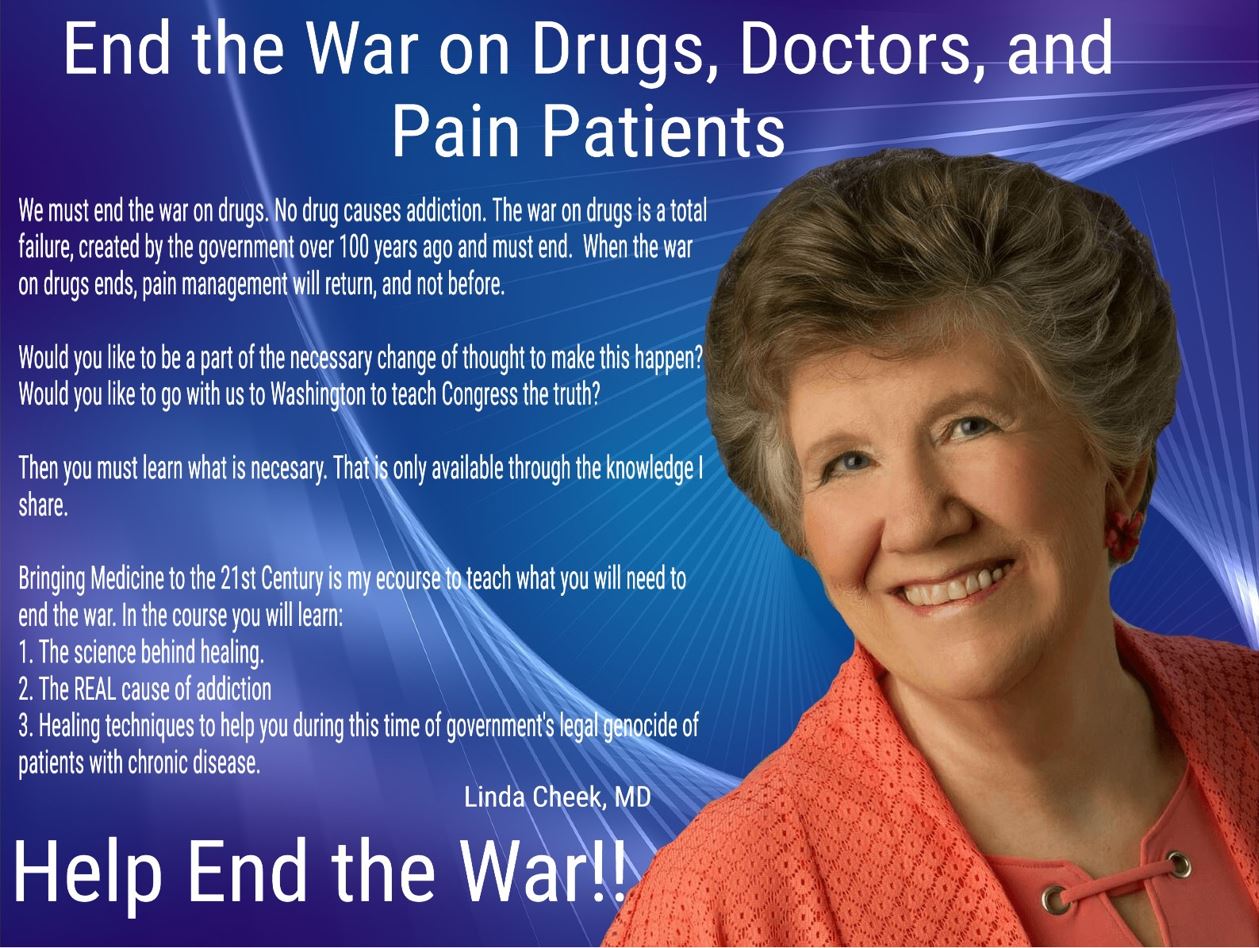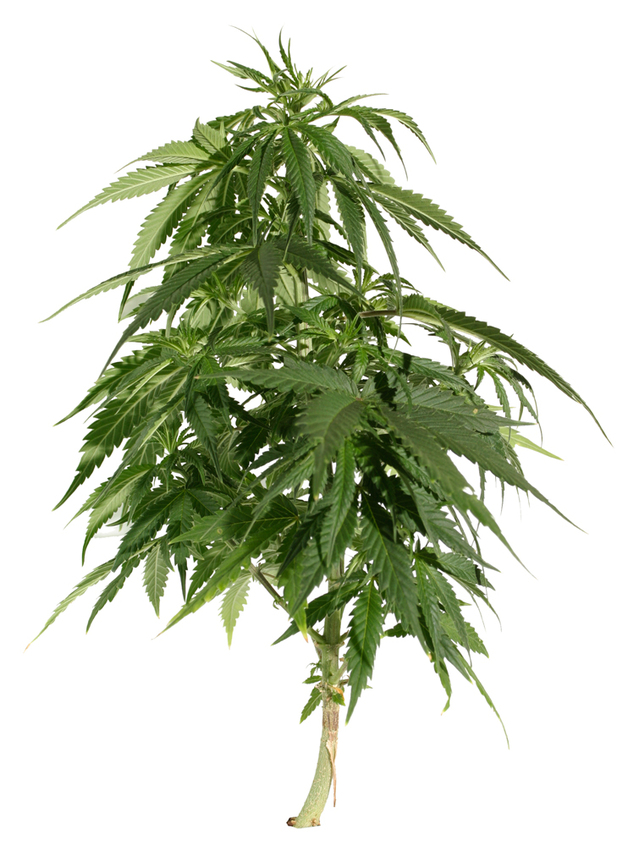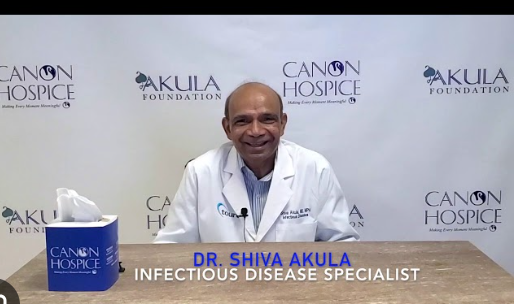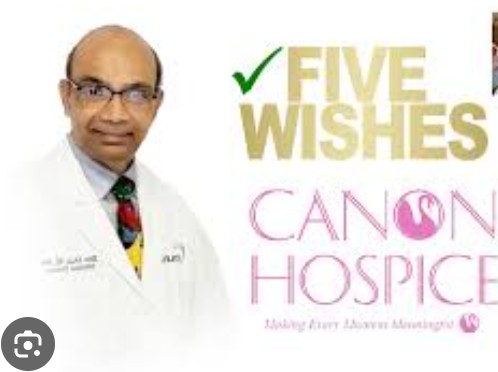

News on the
War on Drugs,
Doctors, and Patients

Linda Cheek, MD, is interviewed by L. Joseph Parker, MD, to share her history in becoming an advocate, and how we can get the Controlled Substance Act repealed.
Repeal the Controlled Substance Act

End the War on Drugs, Doctors, and Pain Patients
The ecourse that can end the attacks on pain management is now available for self-study for 6 months. It is self-paced. There will not be a zoom review/Q&A unless there is a group of 10 or more involved, but I am available through email. However, I will not give any personal advice, only go over the points in the ecourse.
So if you want the attacks on pain management to end, learn how to do it. Stop chasing the rabbits. We hold the key to success.
For more information on what is included in the ecourse, go to
Sevenpillarstotalhealth.com

Past Congress Bill Addressing
Legalizing Marijuana
I”ll update this if it gets re-entered this Congress. Meanwhile, you can see how easy it will be to get the CSA totally repealed, if people would just accept it.
On December 7, 2023, Rep. Dave Joyce (R-OH) refiled the Strengthening the Tenth Amendment Through Entrusting States (STATES) 2.0 Act. It’s being cosponsored by Reps. Lori Chavez-DeRemer (R-OR), Brian Mast (R-FL), Earl Blumenauer (D-OR), and Troy Carter (D-LA).
This bill would amend the Controlled Substances Act (CSA) to undo federal criminalization of people acting in compliance with state or tribal cannabis programs. It also goes farther, demonstrating the points we need to make to legislators, by authorizing interstate marijuana commerce and calling for a currently unspecified federal tax on cannabis sales to support regulations and enforcement.
What have I been preaching? We need to show Congress how they are throwing money away with criminalization of drugs that aren’t even the cause of the addiction they have propagandized over the last 20 years, and show them how they can make money through taxation of the legal products.
We need to support this bill, get it passed, and then if we don’t get the CSA repealed before the report to Congress, we need to use the results of this legalization of a drug that had been propagandized as a cause of addiction 50 years ago to show Congress that all scheduled drugs in the CSA should have a similar action.
Here is the Bill:
The ‘‘Strengthening the Tenth Amendment Through Entrusting States 2.0 Act’’
or the ‘‘STATES 2.0 Act”
To amend the Controlled Substances Act to provide for a new rule regarding the application of the Act to marijuana,
SEC. 2. FINDINGS.
(1) States have vastly different visions for the role of legal cannabis in their cities and counties. Some wish to see a complete prohibition, while others believe cannabis should be treated like alcohol. States should be empowered to determine their own destiny for the cannabis markets. They should be able to enact time, place, and manner restrictions that help to aid small and craft businesses, impose regulations for health and safety, keep cannabis businesses away from schools, and generally fit with the character and values of the community.
(2) While States have the power to determine what happens within their own borders, they cannot make laws permitting or restricting interstate commerce unilaterally. In the absence of Federal movement, the illicit interstate trade in cannabis has persisted even in the face of significant State policy changes. The Federal Government should be responsible for regulating and tracking this interstate trade to ensure cannabis does not end up where it does not belong.
(3) Today’s illicit marijuana market represents 75 percent of the known marijuana market.
(4) Excessive taxation in licensed markets has caused the price of legal marijuana products to exceed that of illegal products by two to three times, contributing to the growth of the illicit market.
(5) Because of Federal restrictions on marijuana activities, marijuana is currently regulated by a punitive tax structure that harms the ability of licensed operators to sell marijuana products, discourages new business creation and growth, and perpetuates illicit markets.
(6) A Federal regulatory program for marijuana should require a framework that supports critical components such as proper administration and oversight, consumer safety protections, and enforcement.
(7) The cost of such a program should fall on users of the program through the establishment of a Federal excise tax. Such a Federal marijuana tax should—
(A) support a legal market, not illegal sales and illicit activity;
(B) be low enough to not exacerbate the level of taxation set by States, thereby avoiding the pyramid effect of adding Federal taxes on top of high State taxes;
(C) be administrable and allow for consistent and timely collection by the Alcohol and Tobacco Tax and Trade Bureau as primary regulator; and
(D) offset the costs of executing the administrative functions of a Federal regulatory framework for marijuana, including requirements for testing, enforcement and policing, youth prevention, and substance abuse prevention and education.
(8) States that legalize cannabis utilize less public safety resources on cannabis arrests. This has allowed more police resources to be devoted to violent and property crime as well as more serious types of illicit substances.
SEC. 3. SENSE OF CONGRESS REGARDING FDA SUPPORT FOR TRIBAL SELF-DETERMINATION AND SELF-GOVERNMENT WITH RESPECT TO MARIJUANA REGULATION.
It is the sense of Congress that, with respect to the regulation of the manufacture, production, possession, distribution, dispensation, administration, or delivery of marijuana, the Food and Drug Administration should support—
(1) self-determination and self-government by Indian tribes (as defined in section 102 of the Federally Recognized Indian Tribe List Act of 1994 (25 1 U.S.C. 5130)); and
(2) the treaty rights of such Indian tribes.
SEC. 4. RULE REGARDING APPLICATION TO MARIJUANA.
Part G of the Controlled Substances Act (21 U.S.C. 5 801 et seq.) is amended by adding at the end the following:
‘‘RULE REGARDING APPLICATION TO MARIJUANA
‘‘SEC. 710. (a) STATES.—Notwithstanding any other provision of law, the provisions of this Act as applied to marijuana, except the provisions described in subsection (d) and except as provided in subsection (e), shall not apply to any marijuana manufactured, produced, possessed, distributed, dispensed, administered, or delivered in compliance with State law relating to the manufacture, production, possession, distribution, dispensation, administration, or delivery of marijuana.
‘‘(b) INDIAN TRIBES.—Notwithstanding any other provision of law, the provisions of this Act related to marijuana, except the provisions described in subsection (d) and except as provided in subsection (e), shall not apply to marijuana manufactured, produced, possessed, distributed, dispensed, administered, or delivered in compliance with the law of a federally recognized Indian Tribe relating to the manufacture, production, possession, distribution, dispensation, administration, or delivery of marijuana within its jurisdiction in Indian country, as defined in section 1151 of title 18, United States Code, so long as such jurisdiction is located within a State that permits, as applicable, the manufacture, production, possession, distribution, dispensation, administration, or delivery of marijuana.
(c) INTERSTATETRANSPORTATION.—
(1) STATE LAW.—
(A) IN GENERAL.—No State or Indian Tribe may prohibit the transportation or shipment of marijuana through the State or the territory of the Indian Tribe, as applicable, if the originating and destination States or territories permit, as applicable, the manufacture, production, possession, distribution, dispensation, administration, or delivery of marijuana.
(B) RULE OF CONSTRUCTION.—Subparagraph (A) shall not be construed to limit the authority of an originating or destination State or territory to impose reasonable restrictions within its jurisdiction on the manufacture, production, possession, distribution dispensation, administration, or delivery of marijuana—
(i) through time, place, and manner restrictions; or
(ii) to protect public health and safety.
(2) FEDERAL LAW.—Notwithstanding any other provision of law, the provisions of this title as applied to marijuana, except the provisions described in subsection (d) and except as provided in subsection (e), shall not apply to any person engaged in marijuana transportation or shipment between two States which States permit, as applicable, the manufacture, production, possession, distribution, dispensation, administration, or delivery of marijuana.
(d) PROVISIONS DESCRIBED.—The provisions described in this subsection are—
(1) section 401(a)(1), with respect to a violation of section 409 or 418;
(2) section 409;
(3) section 417; and
(4) section 418.
(e) EXCEPTION.—Subsections (a) through (c) shall not apply to any person who—
(1) violates this title with respect to any controlled substance other than marijuana;
(2) knowingly or intentionally manufactures, produces, possesses, distributes, dispenses, administers, or delivers any marijuana in violation of the laws of the State or Indian Tribe in which such manufacture, production, possession, distribution, dispensation, administration, or delivery occurs; or
(3) employs or hires any person under 18 years of age to manufacture, produce, distribute, dispense, administer, or deliver marijuana.
(f) REMOVALFROMSCHEDULE.—
(1) IN GENERAL.—For the purposes of this title, marijuana manufactured, produced, possessed, distributed, dispensed, administered, or delivered in compliance with State law or the law of a federally recognized Indian Tribe relating to the manufacture, production, possession, distribution, dispensation, administration, or delivery of marijuana shall be deemed to be a substance that does not meet the requirements for inclusion in any schedule.
(2) RULES.—Not later than 180 days after the date of the enactment of this Act, the Attorney General shall finalize a rule under section 201(a)(2) executing paragraph (1) of this subsection.
SEC. 5. TRANSPORTATION SAFETY OFFENSES.
Section 409 of the Controlled Substances Act (21 2 U.S.C. 849) is amended—
(1) in subsection (b), in the matter preceding paragraph (1)—
(A) by striking ‘‘A person’’ and inserting ‘‘Except as provided in subsection (d), a person’’; and
(B) by striking ‘‘subsection (b)’’ and inserting ‘‘subsection (c)’’;
(2) in subsection (c), in the matter preceding paragraph (1)—
(A) by striking ‘‘A person’’ and inserting ‘‘Except as provided in subsection (d), a person’’; and
(B) by striking ‘‘subsection (a)’’ and in-serting ‘‘subsection (b)’’; and
(3) by adding at the end the following:
(d) EXCEPTION.—Subsections (b) and (c) shall not apply to any person who possesses, or possesses with intent to distribute marijuana in compliance with section 710.’’
SEC. 6. DISTRIBUTION TO PERSONS UNDER AGE 21.
Section 418 of the Controlled Substances Act (21 24 U.S.C. 859) is amended—
(1) in subsection (a), in the first sentence, by inserting ‘‘and subsection (c) of this section’’ after ‘‘section 419’’;
(2) in subsection (b), in the first sentence, by inserting ‘‘and subsection(c) of this section’’ after ‘‘section 419’’; and
(3) by adding at the end the following:
(c) Subsections (a) and (b) shall not apply to any person at least 18 years of age who distributes medicinal marijuana to a person under 21 years of age in compliance with section 710.’’.
SEC. 7. REGULATION OF MARIJUANA PRODUCTS BY FDA.
(a) DEFINITIONS.—
(1) MARIJUANA PRODUCT DEFINED.—In this section, the term ‘‘marijuana product’’ means any product made or derived from marijuana that is intended for human or animal consumption, including any component of marijuana (except for raw materials other than such marijuana used in manufacturing a component of such product).
(2) OTHER DEFINITIONS.—In this section:
(A) The term ‘‘biological product’’ has the meaning given to that term in section 351(i) of the Public Health Service Act (42 U.S.C. 1 262(i)).
(B) The term ‘‘marijuana’’ has the meaning given to that term in section 102 of the Controlled Substances Act (21 U.S.C. 802).
(C) The terms ‘‘cosmetic’’, ‘‘device’’, ‘‘dietary supplement’’, ‘‘drug’’, ‘‘food’’, and ‘‘tobacco product’’ have the meanings given to such 8 terms in section 201 of the Federal Food, Drug, and Cosmetic Act (21 U.S.C. 321).
(b) DRUGS.—A marijuana product meeting the definition of a drug shall be treated as a drug for purposes of the Federal Food, Drug, and Cosmetic Act (21 U.S.C. 13 301 et seq.).
(c) FOOD; DIETARY SUPPLEMENTS.—The Secretary of Health and Human Services, acting through the Commissioner of Food and Drugs, shall have the same authorities under the Federal Food, Drug, and Cosmetic Act (21 18 U.S.C. 301 et seq.) and other applicable law to regulate a marijuana product that is food or a dietary supplement as the Food and Drug Administration has with respect to food containing alcohol.
(d) COSMETICS.—A marijuana product meeting the definition of a cosmetic shall be treated as a cosmetic for purposes of the Federal Food, Drug, and Cosmetic Act (21 U.S.C. 301 et seq.).
(e) OTHERPRODUCTS.—
(1) INGENERAL.—A marijuana product that is not covered by subsection (b), (c), or (d) may be lawfully marketed pursuant to regulations issued under paragraph (2).
(2) REGULATION.—Not later than 180 days after the date of enactment of this Act, the Secretary of Health and Human Services, acting through the Commissioner of Food and Drugs, shall promulgate a regulation with respect to marijuana products described in paragraph (1).
(3) CONTENTS.—The regulation under paragraph (2) shall include requirements for—
(A) contaminant testing;
(B) manufacturing practices; and
(C) marketing practices and postmarket reporting, with special attention to preventing consumption by youths.
(4) NO PREMARKET APPROVAL REQUIRED.—The regulation under paragraph (2) shall not require premarket approval of marijuana products described in paragraph (1).
(f) NO MARKETINGIN COMBINATION WITH CERTAIN OTHERPRODUCTS.—A marijuana product marketed in combination with a drug, a biological product, a device, a tobacco product, or an alcohol product is deemed to be adulterated for purposes of the Federal Food, Drug, and Cosmetic Act (21 U.S.C. 301 et seq.).
SEC. 8. COMPTROLLER GENERAL STUDY ON EFFECTS OF MARIJUANA LEGALIZATION ON TRAFFIC SAFETY.
(a) IN GENERAL.—The Comptroller General of the United States shall conduct a study on the effects of marijuana legalization on traffic safety.
(b) INCLUSIONS.—The study conducted under subsection (a) shall include a detailed assessment of—
(1) traffic crashes, fatalities, and injuries in States that have legalized marijuana use, including whether States are able to accurately evaluate marijuana impairment in those incidents;
(2) actions taken by the States referred to in paragraph (1) to address marijuana-impaired driving, including any challenges faced in addressing marijuana-impaired driving;
(3) testing standards used by the States referred to in paragraph (1) to evaluate marijuana impairment in traffic crashes, fatalities, and injuries, including any scientific methods used to determine impairment and analyze data; and
(4) Federal initiatives aiming to assist States that have legalized marijuana with traffic safety, including recommendations for policies and programs to be carried out by the National Highway Traffic Safety Administration.
(c) REPORT.—Not later than 1 year after the date of enactment of this Act, the Comptroller General of the United States shall submit to the appropriate committees of Congress a report on the results of the study conducted under subsection (a).
SEC. 9. RULE OF CONSTRUCTION.
(a) IN GENERAL.—Conduct in compliance with this Act and the amendments made by this Act—
(1) shall not be unlawful;
(2) shall not constitute trafficking in a controlled substance under section 401 of the Controlled Substances Act (21 U.S.C. 841) or any other provision of law;
(3) shall not constitute the basis for forfeiture of property under section 511 of the Controlled Substances Act (21 U.S.C. 881) or section 981 of title 18, United States Code; and
(4) shall not be subject to section 280E of the Internal Revenue Code of 1986, relating to expenditures in connection with the illegal sale of drugs.
(b) PROCEEDS.—The proceeds from any transaction in compliance with this Act and the amendments made by this Act shall not be deemed to be the proceeds of an unlawful transaction under section 1956 or 1957 of title 7, United States Code, or any other provision of law.
NO GOOD DEED GOES UNPUNISHED
IF YOU ARE A MINORITY PHYSICIAN IN AMERICA
SHIVA AKULA, MD FIGHTS BACK


LOUISIANA GOVERNOR, JEFF LANDRY, NAMED AS DEFENDANT IN CIVIL RACKETEERING LAWSUIT |
On January 10, 2023, a lawsuit was filed in the United States District Court for the Eastern District of Louisiana by Dr. Shiva Akula, a successful American Indian physician based in Louisiana, whose immense philanthropic efforts during Hurricane Katrina were recognized by the United States Government.
As many medical personnel rapidly evacuated New Orleans with the flooding caused by Hurricane Katrina, Dr. Akula, his family, and his staff refused to abandon those citizens who lacked the means to leave or simply had nowhere to go. In keeping his medical facilities open and operating through the tidal storm surges, he placed his own life at risk in an expression of rarely witnessed solidarity with the people of the community in which he had built his life and career.
In August 2021, Dr. Akula’s unblemished career and life were unexpectedly and unjustly upended, when he became the subject of a criminal indictment filed by the US Attorney for the Eastern District of Louisiana, in which he was falsely accused of committing healthcare fraud, a charge that Dr. Akula is vigorously contesting.
Subsequent to the January 10, 2023, filing of his racketeering case against, amongst others, the recently elected Louisiana Governor, Jeff Landry, facts have emerged that prove the criminal indictment was a direct consequence of a conspiracy between the insurance company that owed his hospice care corporation money, his market competitor, and certain members of his staff. A number of these individuals were recently indicted by the State Attorney General for perpetrating a payroll fraud scheme against Dr. Akula, in which they embezzled money from his business with false claims of having worked more hours than they did (SHAYVON MURPHY M606260 – KIEMOND WILLIAMS M606753 – NIKITA MURPHY M606279 – VASCHELLE HASTINGS M606162 IN THE ORLEANS PARISH COURT).
With the commencement of Dr. Akula’s criminal trial scheduled for October 30, 2023, at the United States District Court for the Eastern District of Louisiana, he continues to contest the validity of the charges, and maintains that his Indian ethnicity was a principal reason as to why he was targeted.
Dr. Akula is one of the most recent ethnic minority physicians to be criminally indicted for alleged healthcare fraud. However, he hopes that the publicization of his fight will raise public awareness of the insurance industry orchestrated mass incarceration of innocent ethnic minority physicians, a cause for which he is willing to sacrifice his life.
Time will tell.
Addendum:
Dr. Akula was convicted Nov 8, 2023, on all charges. This just demonstrates the evil weaponization of the DOJ against the medical profession, especially minority physicians. Gross government misconduct in the courtroom is rampant, as there is no repercussion. He is currently incarcerated at Memphis FCI with a discharge date of 11/7/40.
Doctors of Courage Podcast Links:
Neil Anand, MD on Daily Remedy Podcast
Dr. Anand is a champion in the fight against the illegal attacks on doctors. He has done a lot of research in the area of algorithms used to target physicians. Listen to his explanation of what the government is doing to target, indict, and convict innocent doctors using the Controlled Substance Act.
Patriot Nurse on the Decline of Healthcare
Patriot nurse speaks on what I’ve been saying for 20 years. The medical profession is being controlled by the government through hospital-owned doctors. The compassionate physicians are being put in prison. What people need to do is become their own physician through learning alternative, healing medicine. That’s what I offer in my ecourses. So if you don’t believe me, here is another convincing testimony.
Roundtable with Ron Chapman, II and Summer McKeivier of Chapman Law Group.
Law is a specialty, just like medicine. Back in the 1800’s, you might have a general practitioner set a fractured bone and give birth to a baby. But today, it is not unusual to consider a specialist for everything. You wouldn’t want a general practitioner doing open heart surgery or remove a tumor from your brain. Well, the same is true of law, but doctors often stay with the “general practice” lawyer for something that is life-threatening. In this roundtable discussion, the 8 signs of the wrong lawyer for the job are discussed. It would be better to hire the right lawyer from the beginning. Otherwise, all the money you paid the wrong lawyer is wasted, because generally they spent most of it learning what to do that Chapman Law Group already knows, and can save that time and money.
The Interview of Linda Cheek, MD, by Ron Chapman, II of The Chapman Law Group, the law firm that is helping end the War on Doctors.
Linda Cheek is a teacher and disenfranchised medical doctor, turned activist, author, and speaker. A victim of prosecutorial misconduct and outright law-breaking of the government agencies DEA, DHHS, and DOJ, she hopes to be a part of exonerating all doctors illegally attacked through the Controlled Substance Act. She holds the key to success, as she can offset the government propaganda that drugs cause addiction with the truth: The REAL Cause of Drug Abuse.
Get a free gift to learn how the government is breaking the law to attack your doctor: Click here to get my free gift